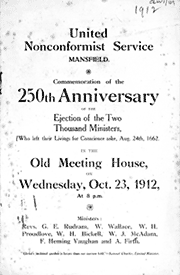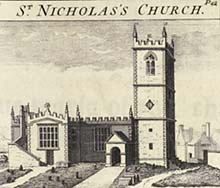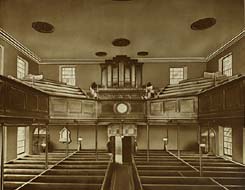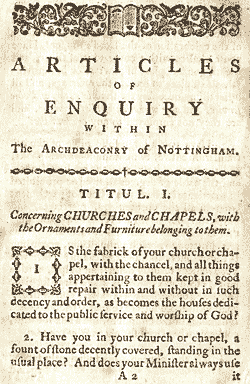Decline and Abolition

Brochure for 250th anniversary service of ejection of ministers in 1662, at the Old Meeting House, Mansfield, 1912 from Ol/WL 103
The Archdeaconry Court did not function during the Commonwealth, but resumed its business after 1660. The story of the Court until the late 18th century is one of gradually declining relevance in the life of local communities.
The churches had suffered during the Civil War. The congregation of St Nicholas in Nottingham had to meet at St Peter's, as the parish church had been 'utterly ruined by the late unhappy warrs' and had no minister. A new church was built on the site in 1678.
The authorities quickly tried to reimpose their former control of parish life. The churchwardens of Nottingham St Mary in 1664 enthusiastically presented 'All the parishioners that are shoppe keepers' for opening their shops on holy days when they fell on a Saturday - Saturday being Market Day.
Presbyterian and Independent sects had flourished in the Interregnum, but Parliament tried to prevent non-conformists from worshipping together. In 1662, a number of local Puritan ministers were forced out of their livings and moved to Mansfield where the minister, John Firth, was sympathetic. They returned to Nottingham after the passing of the Act of Toleration in 1689, and founded Castle Gate Independent chapel and High Pavement Unitarian chapel.

St Nicholas's Church, Nottingham, from Charles Deering's Nottinghamia Vetus et Nova (1751) From East Midlands Spec. Coll., Not 314.DEE

Interior of High Pavement Chapel until 1874 from Hi P13/8
By the 1700s the churchwardens had begun reporting a much smaller range of offences. They focused on obvious moral lapses such as the birth of illegitimate children.
In Easter 1751, nine out of ten reports were 'omnia bene', or 'nothing to present'. However, as can be seen from the document below, full Articles of Enquiry concerning all possible ecclesiastical offences were issued up to the end of the 18th century.
The last surviving Excommunication notice dates from 1768, the last Penance was issued in 1794, and presentments ceased to be recorded in the Act Books from February 1796.
- Easter 1668 Not attending church
- Easter 1688 Not paying church duties
- Easter 1708 Not paying church duties
- Easter 1728 Having illegitimate children
- Easter 1751 Having illegitimate children

Articles issued to churchwardens to answer at the Archdeacon's Visitation, 1785 from Dr X 3
Next: Windows on the community